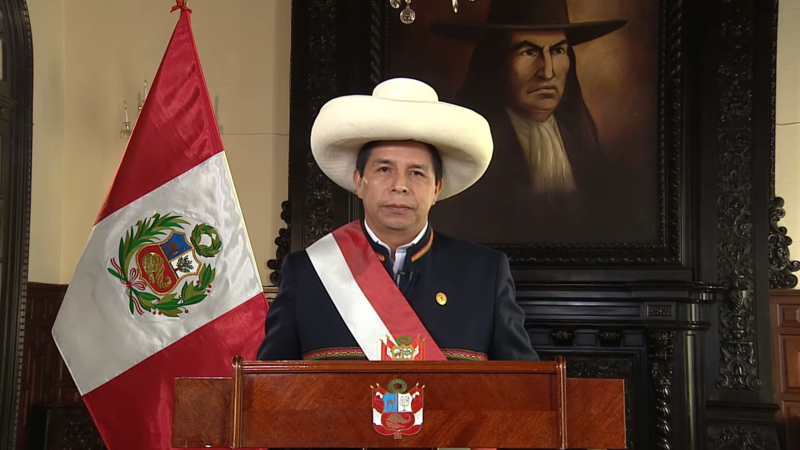In the last few hours, the political crisis has accelerated in Peru. President Castillo decreed the closing down of Congress, but was swiftly arrested by police. Congress voted to impeach him and proclaimed his vice president as the new president.
What does this mean?
We must leave aside constitutional appearances and go to the root of the processes to understand what has happened: the CONFIEP (employers’ confederation), the army, the police, the capitalist media, the US embassy and the mining multinationals have, through their agents in Congress, removed President Castillo from the office to which he was democratically elected by the people. It is therefore a reactionary coup.
Castillo, a grassroots teachers’ union leader with strong roots in the rural areas, was elected against all odds in July 2021. That was an expression of the anger of the exploited masses in Peru, of the poor peasants, the workers, the indigenous people. All the most oppressed layers of society aspired to a fundamental change in power relations expressed in the demand for a Constituent Assembly. They rallied behind Castillo’s slogan that “there should be no poor people in a rich country”. The capitalist owners of the country could not accept this.
Castillo, and the party he stood for, Peru Libre, faced two serious limitations:
Firstly, their political programme – social reforms but without breaking with capitalism. This was utopian and the attempt to implement it could only have two possible outcomes: either reforms were implemented that led to a break with capitalism, or capitalism would be maintained and the reforms would not be implemented.
Secondly, the parliamentary arithmetic was unfavourable, and therefore the democratic will of the masses could only be implemented through mass pressure on the streets, but there was never a serious call on the part of Castillo nor Perú Libre to mobilise or organise such pressure.
Once Castillo resigned himself to being cornered within the narrow framework of bourgeois institutionality, he made ever greater concessions to the capitalist ‘powers that be’. He removed ministers who were not to the liking of the mining multinationals. He removed the chancellor against whom the military had protested. He changed those whom the CONFIEP bosses federation did not want. This was a fatal mistake, because the oligarchy was not satisfied and demanded more concessions, while each concession undermined Castillo’s support amongst his own social base, which was his only hope of salvation.
Was there an alternative? Yes. The alternative was to call the masses onto the streets, to disband Congress and to convene a National Revolutionary Assembly, and combine that with the striking of blows against the political and economic power of the capitalist oligarchy (nationalisation of gas, reversal of mining contracts, etc). A risky strategy that could have failed? Of course, in the class struggle there is no guarantee of victory. But along the road of conciliation one thing is guaranteed: it will lead to disaster.
There were also mistakes on the part of Perú Libre (which had broken with Castillo) and its leader Cerrón. On occasions they flirted with Fujimorismo [the right wing political current of former president-dictator Fujimori] in Congress out of pure spite against Castillo. Instead, PL should have worked to build a solid base amongst the masses by organising to put pressure on Castillo from the left and, if he did not follow, to prepare to overtake him.
About a month ago, when Castillo had already lost practically all his political capital, with sympathy among the most oppressed sectors but without organisation or mobilisation, having broken his parliamentary bench, he then... appealed to the OAS! This was exactly the same mistake Evo made in Bolivia, with the same result [their overthrow]. It would seem as if lessons have not been learned.
And finally, in a last desperate act, to avoid the vote on the impeachment, today he moved to disband Congress, but instead of relying on the mobilisation of the masses to impose the decree, he seemed to be waiting for the support of... the army!
The ruling class moved like the well-oiled machine that it is, with a plan prepared in advance. Castillo has been arrested. There is a political agreement between Fujimorismo, the traditional right wing and the so-called ‘caviar’ left. Impeachment has been passed by Congress (with the majority support of the PL benches and that of the so-called “teachers' block”, Castillo’s own). Castillo’s vice-president has been appointed president with the broad support of Congress and has called for a government of "national unity" (i.e., unity of all parties against the aspirations of the working people). The OAS and the USA have swiftly recognised this new government, which has not come from the ballot box. The coup has been consummated.
All that remains to be seen is the reaction of the masses in the next few hours. It is to be expected that they will come out, particularly outside Lima, in the rebellious south and in the rural provinces. How strongly and with what degree of decisiveness is not clear. Castillo has undermined his own social base, but the hatred of the oligarchy runs deep.
From the outside, it remains for us to organise the international repudiation of the coup and to help the process of drawing the necessary conclusions for Peru and Latin America. Because even if the new regime is consolidated, and this is by no means guaranteed, this is only one battle. The war continues.

